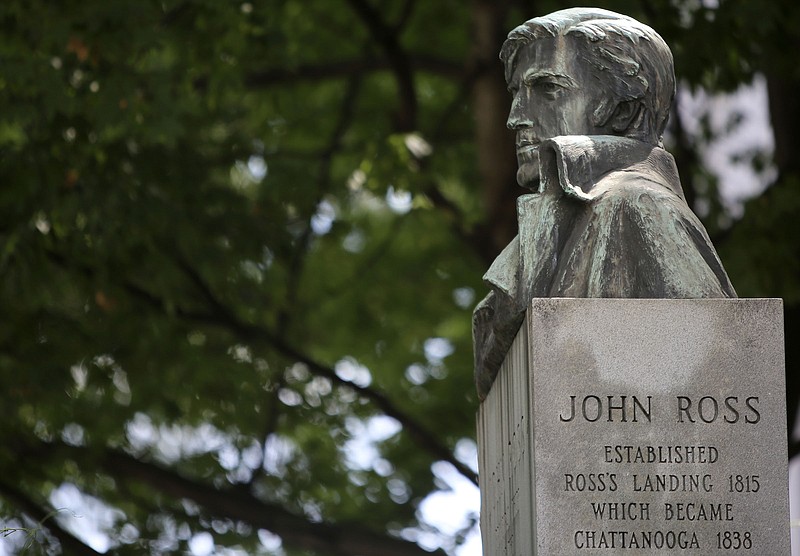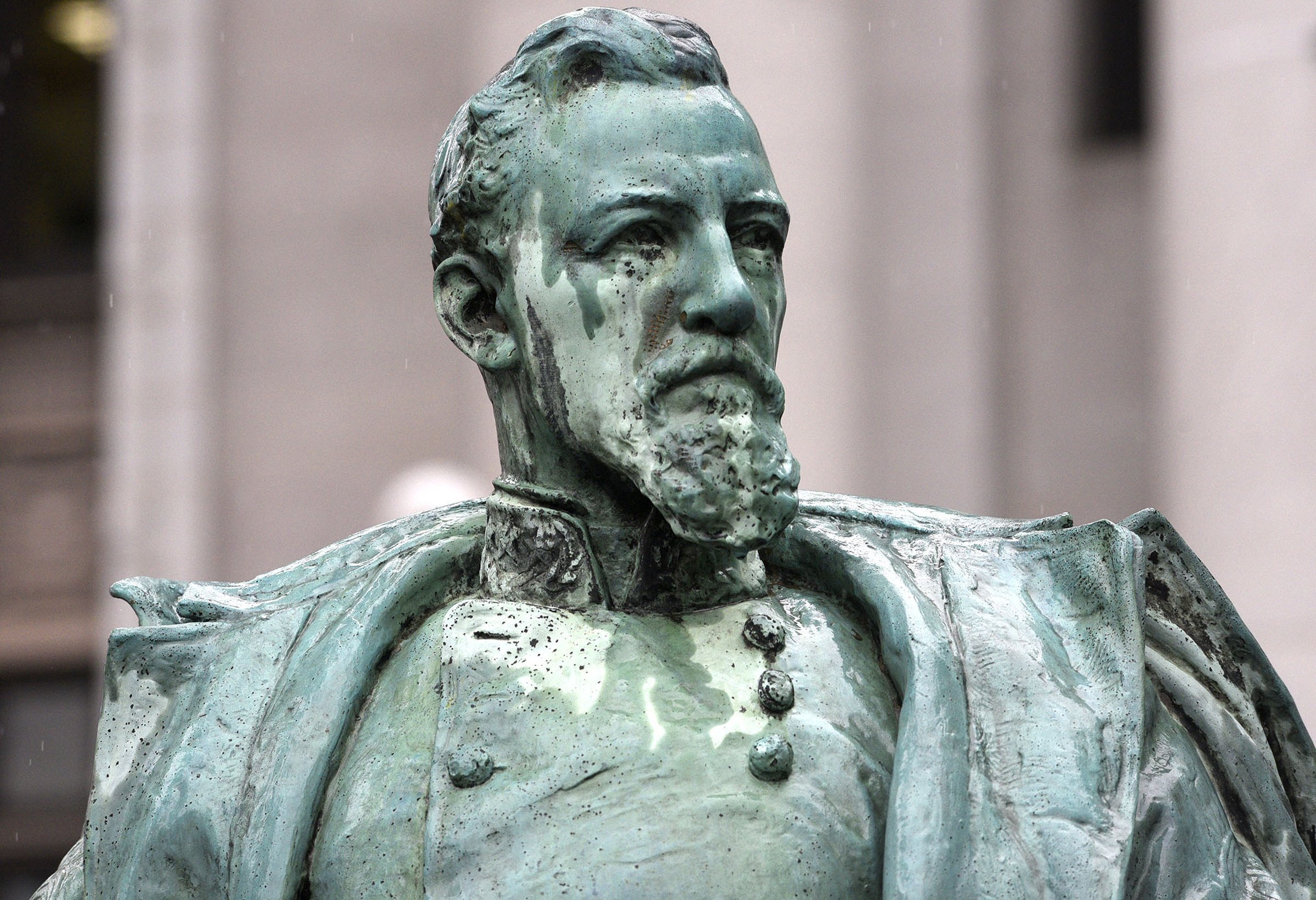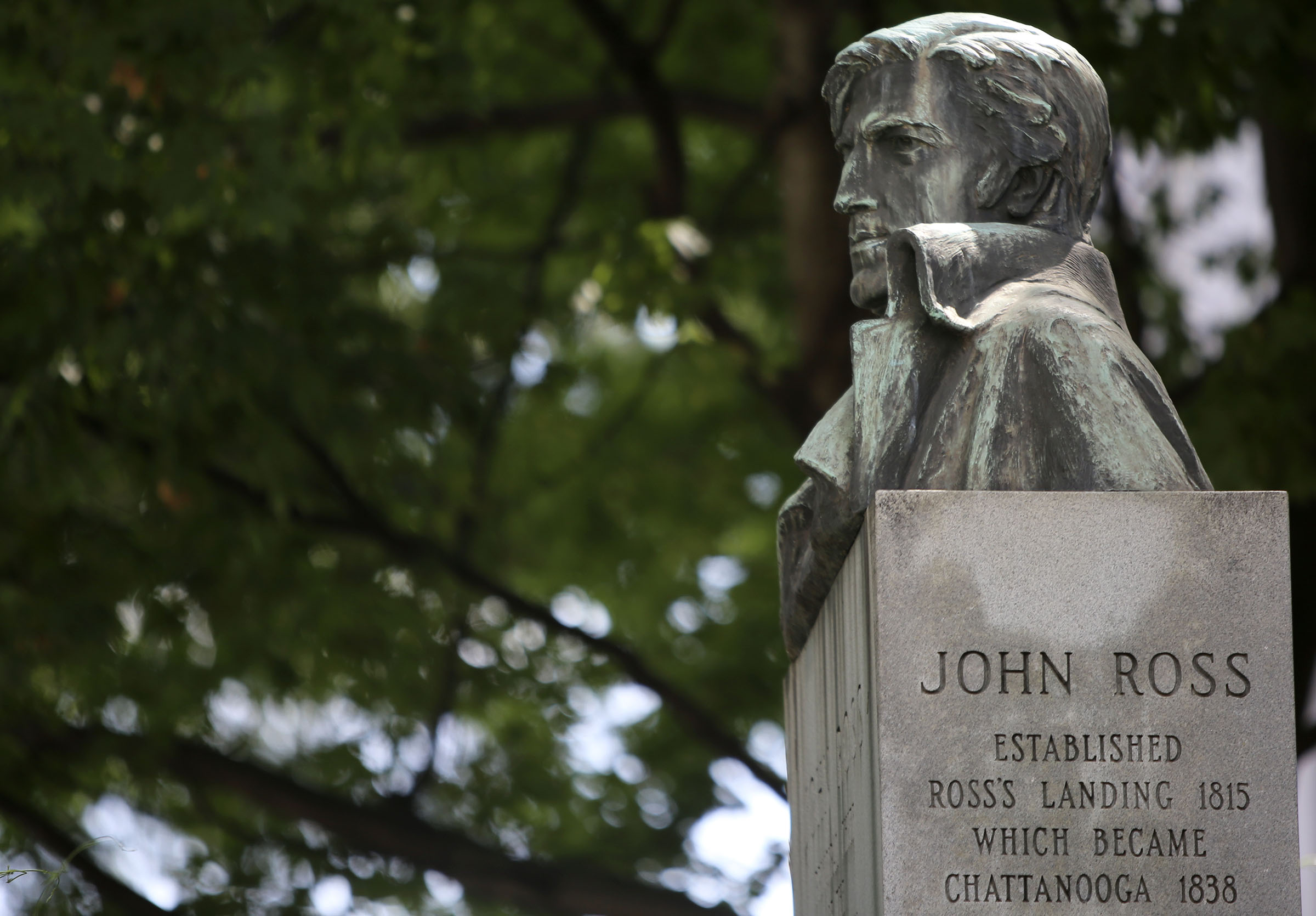Presented with a petition, Hamilton County commissioners are grappling with the legacies of Confederate Gen. A.P. Stewart and Chief John Ross, as well as the value of historical monuments at the county courthouse.
An online petition with around 1,100 signatures was presented to the commission Wednesday, calling for the removal of a statue honoring Stewart - a Confederate general who later served as commissioner of the Chickamauga and Chattanooga National Military Park - which is placed prominently outside of the old Hamilton County Courthouse on Georgia Avenue.
"I ask each of you, is it possible in these troubled times to move from divisiveness to mutual respect? Is it possible to move from exclusiveness to inclusiveness?" Betsy Darken, a former professor at the University of Tennessee at Chattanooga who began the petition, asked the commission. "Can we become a more harmonious community? The bust of Gen. A.P. Stewart is divisive and exclusive.
"We are asking you to relocate this bust to show respect for all of our citizens, to include all of us in what is honored in public spaces."
While Stewart reportedly never supported slavery - serving the Confederacy because of related matters - 10 speakers gave prepared statements pleading for the commission to remove the statue, citing the white supremacist values of the cause for which he fought.
"As a child, fear was my constant companion whenever I saw the Confederate flag, proudly and prominently displayed," said Jean Smith, who grew up and lives in Chattanooga. "I ask why would the county of my birth seek to proudly and prominently seek to display the bust of a supporter of the Confederacy, whose mission was to maintain people who looked like me in a state of perpetual enslavement?"
(READ MORE: Confederate statue will be restored after weekend George Floyd protests in Chattanooga)
Commission Chair Chip Baker allowed all 10 speakers to read their statements, resulting in half an hour of comments, despite a commission rule that would allow him to limit a single side of a specific issue to 20 minutes, which some commissioners asked him to follow.
A resolution to remove the statue failed 6-2 in 2017. Now, with a slightly new group of commissioners, Commissioner Warren Mackey hopes to see change akin to Mississippi removing the Confederate flag from its state flag this summer.
"Next week, if no one else does, I will bring a resolution and unfortunately it will put some commissioners in a situation where they have to voice and say where they stand on this issue," Mackey, who has a doctorate in history from Middle Tennessee State University, said Wednesday. "It is an uncomfortable conversation, as I said, but it's one that is necessary.
"If the state of Mississippi can take that rebel flag off their state flag, it makes Hamilton County look pretty sorry."
Later, Mackey called members of the Confederacy "traitors" for revolting against the United States government and criticized the South's memorialization of Confederate leaders on monuments.
"Were you to go to Germany right now, you would not find one single statue of Hitler," he said. "You won't find an Adolf Hitler Lee Highway."
Chris Dooley, a retired Air Force colonel in Chattanooga, argued that Stewart should not be considered a traitor.
"President [Andrew] Johnson, on Dec. 18 in 1868, entered an unconditional and without reservation full pardon to officers and folks that had been accused of treason against the United States," Dooley said, debating Mackey's earlier comment.
"A.P. [Stewart] is more than just a Confederate general. He is someone who was on the forefront of reunifying the country."
Among the new commissioners willing to consider removing the statue is David Sharpe, who shared his own misgivings about the Confederacy as a child and his great-great-grandfather, a Union soldier who was captured on horseback by the Confederates. He said removing the statue would be a sign of growth in a region often saturated with Confederate symbols and narratives.
"I for one, as a young southern man growing up in the Chattanooga area, recall premature emotions of glory of the Old South and the Confederacy," he said. "And frankly my own ancestors, my grandmother's grandfather, fought for the Union Army in upper East Tennessee."
Even if the commission cast a majority vote to remove the statue, approval is required from the Tennessee Historical Commission. The Daughters of the Confederacy, who erected the statue, may also play a role, according to one commissioner, who wants to address other potentially problematic memorials on the courthouse lawn.
No more monuments
Commissioner Tim Boyd said after Wednesday's meeting that he supports relocating the statue, but only if all other monuments are removed and future monuments prevented.
"I think we should relocate all four of the plaques and monuments at the courthouse, and we should prevent there ever being any more monuments at the county courthouse," Boyd told the Times Free Press. "I just think we need to remove them the right way, and we need to make sure nothing else ever goes in their place."
Boyd advocated for the relocation of both the Stewart statue and one of Cherokee Chief John Ross, who is credited as a founder of Chattanooga and the namesake of Ross's Landing and other monuments around town despite documented slave ownership.
"The courthouse is somewhere business is done, and everyone needs to feel equally welcomed without any chance of walking by anything that might offend them."
Boyd said he has been planning a petition for the county to approach the Tennessee Historical Commission to facilitate "appropriate and consistent" changes to the courthouse monuments.
"I brought this up to my fellow commissioners months ago, and I've even been talking to a prominent nonprofit about covering the legal costs," he said. "We should do something about it, but I won't entertain a resolution on something we have no control over."
Boyd said the county should present a petition to the Tennessee Historical Commission - which has to approve all renaming, relocating or removing of monuments per the 2016 Tennessee Heritage Protection Act - to remove the statues of Stewart and Chief John Ross, a founder of Chattanooga who is also recognized as the owner of "numerous" slaves by historians.
But, Boyd notes, there is no appeals process, so if the county were to appeal to the Historical Commission, the pitch would need to be "200% ready" ahead of time.
"If it's about being against slavery, it's got to be more about the Confederates who were defending Tennessee from the Union invading," he said. "And we've got to have those kinds of details ironed out before we would submit anything to the state because if you lose, you lose."
Boyd suggested that moving the plaques to either the sidewalk or retaining wall, a less prominent but still present location at the courthouse, would be most appropriate. Then, he said, the statues of Ross and Stewart should be moved to Ross' Landing and a city park, respectively.
"I can tell you that if something comes before commission that involves moving [Stewart] but not moving all of them to a reasonable location and preventing future monuments from the lawn, I won't be any part of it," he said. "I won't even acknowledge it or vote on it if it's not about all monuments."
Sharpe said during Wednesday's meeting that he disagrees with the state's "preemption" on monuments but would consider steps to address that.
Contact Sarah Grace Taylor at staylor@timesfreepress.com or 423-757-6416. Follow her on Twitter @_sarahgtaylor.


